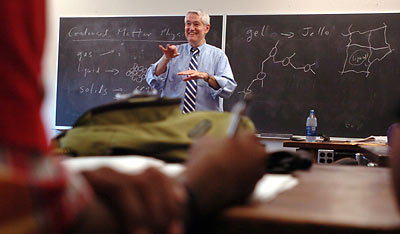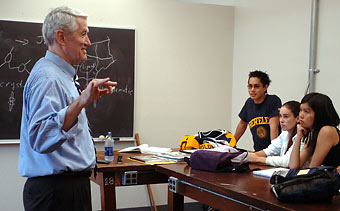UC Berkeley Web Feature
 |
Chancellor Robert J. Birgeneau shares his enthusiasm for physics with high school students in the Upward Bound Math-Science program. (Photos by Sean Connelley / Oakland Tribune) |
Birgeneau talks up physics – and opportunity – in return to classroom
BERKELEY – World-class physicist and UC Berkeley Chancellor Robert J. Birgeneau returned to the classroom Thursday to talk with a group of high school students about states of matter, flat screen TVs and the secrets of sea monkeys and to share his personal story of becoming the first in his working-class family to graduate from high school and college.
Birgeneau spent an hour - much of it at the chalkboard - with a rapt audience of 15 teenage boys and girls in Upward Bound Math-Science, a federally-funded program for low income high school students. As part of the program, a fixture at UC Berkeley since 1991, the students attend a special six-week summer session and study English, math and a science elective such as physics.
"Once you get launched, and I hope Upward Bound is launching you, the ultimate limits are going to be determined by what's inside you, not by external variables," the chancellor told them. "So, one of the purposes of programs like Upward Bound, and then here at Berkeley our financial aid program, is to make sure than anybody with the talent and the drive and the willingness to work hard enough can have the opportunity. And then there's no limit."
 In talking with the students, who are on campus for six weeks of intensive study of English, math and physics through a federally-funded program for low-income or first-generation-to-college students, Birgeneau talked about how he, too, was the first in his family to graduate from high school and college. |
Birgeneau has long championed diversity and pushed for expanded higher education opportunities for disadvantaged and minority students. Since coming to UC Berkeley in September 2004, he has pledged to work to boost enrollment on campus of blacks and Hispanics, whose numbers have dropped dramatically since the passage of Proposition 209.
He told the class that while growing up in Toronto, he didn't know there was such a thing as physics or an institution such as UC Berkeley.
"Actually, in grade school, I didn't do very well in science," Birgeneau recalled. "I think it was because it was entirely memorizing things as opposed to solving problems, which it turned out I had some talent at."
As luck would have it, a priest at a church where Birgeneau served as an altar boy took an interest in him and sent him to a private boys' high school. He said he was placed initially in classes with the slower learners, probably because the school equated his impoverished background with a lack of intelligence. He gradually worked his way up to classes with the brightest students from more privileged backgrounds.
Even so, Birgeneau said, while he was in high school it never occurred to him that he could attend college.
The summer when he was 15, he worked at a dreary factory job. When a former teacher called him to inquire about his future plans, Birgeneau said he was at a loss. The only professional people he knew were his uncle, who was an accountant, and employees at the drugstore where he had worked as a delivery boy. He told the teacher that maybe he would be an accountant. But the instructor urged him to set his sights higher and offered to help finance Birgeneau's college education.
Birgeneau went on to attend the University of Toronto, earning an undergraduate degree in math. He earned his Ph.D. in physics at Yale University. A college lecture about quantum mechanics - a world he told the Upward Bound students is "mysterious and beautiful" - inspired him to pursue physics.
He then got a fellowship to Yale and took up research.
"It turned out I really liked doing experiments. It's like discovering America. There's a special kick you get out of sitting at an apparatus where a result is coming out and you realize that you're the first human being in the history of the universe to know this, what's happening," Birgeneau told the students. "To understand something that no one's ever understood before is the kind of pleasure that's hard to get any other way."
His career next took him to Oxford University, the Massachusetts Institute of Technology, Bell Laboratories and back to the University of Toronto, where he was president before becoming UC Berkeley's ninth chancellor. During his classroom talk at UC Berkeley on Thursday, Birgeneau called his professional success "the Canadian and the American dream" and advised students that "any one of you can do it."
He noted a UC Berkeley researcher's discovery that an "unknown quantity" called "dark energy" comprises 70 percent of the mass of the universe. "Maybe there's someone in this room that's going to go on to college and then - I think the problem (of deciphering dark matter) will still be around waiting for you - get your Ph.D., and then figure it out what dark energy is. And you'll get the Nobel Prize for that."
In his lecture about the various states of matter, Birgeneau explained the physics behind the flat screen TV and the secrets behind the popular product that changes from a small, dry toy into a water-logged sea monkey when dropped into a bowl of liquid.
Ricky Cruz, 16, of Escondido, called the chancellor's talk "pretty cool." About Birgeneau's remarks about liquid crystals, he said, "I actually kind of got it once he explained it." Cruz said he hopes to one day design safer automobiles.
Gilberto Hernandez, 16, also of Escondido, is spending his second summer in UC Berkeley's Upward Bound Math-Science program. He said he plans to study aerospace engineering, or maybe astrophysics.
Class instructor Anastacio Dalde, a UC Berkeley undergraduate from Hawaii who transferred from a Southern California community college, is majoring in physics. The first member of his family to attend college, Dalde said he was awed by the chancellor: "I'm in college, but he inspired me - like, wow, I can do that, too. I think I know what I want to do a lot better now, and that's teach high school physics."
At UC Berkeley, Upward Bound Math-Science currently serves about 70 students from California, Arizona, Nevada and Hawaii and is designed to increase the number of low income students who pursue degrees in math and science.
It's a sister program to Upward Bound "classic," which began in 1966 as UC Berkeley's first outreach program and currently involves 140 high school students.
Students in both programs are recruited in the 9th or 10th grades and stay with the programs until they graduate from high school. The programs target highly disadvantaged and low income students who hope to be the first in their families to attend college.
Over the past six years, more than 90 percent of students in the two programs at UC Berkeley have enrolled in four-year colleges and universities. More than 40 percent enroll at UC campuses and 25 percent come to UC Berkeley. The programs are among 10 Center for Educational Outreach (CEO) programs that serve more than 20,000 students who face significant barriers to college and that will bring more than 750 students to campus for intensive academic enrichment experiences.
After the chancellor's lecture that was organized by UC Berkeley's
CEO, one student invited him to a Sunday potluck to be held at
the residence hall where the students are living until the Upward
Bound summer program ends July 22. Before he left, the class presented
Birgeneau with an Upward Bound T-shirt and sweatshirt, and he
joined them for a class photo.

